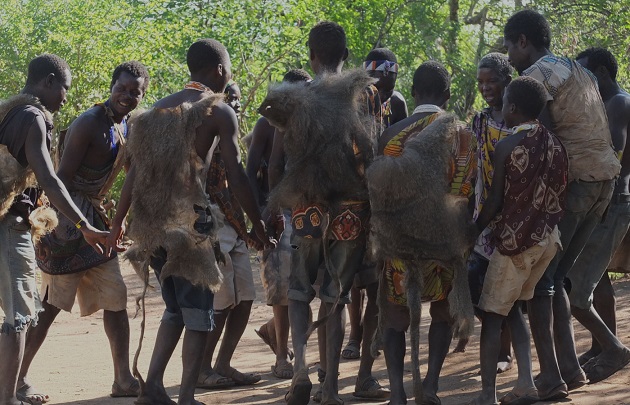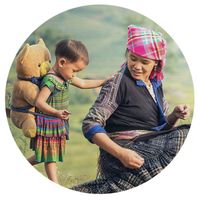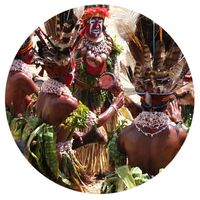Practical resources for advancing the Great Commission.
 Photo: Pixabay, CC0
Photo: Pixabay, CC0
Increasing numbers of missionaries, mission executives, pastors, and cross-cultural church planters are coming to an awareness and recognition that the Orality Movement is transformational in our time.[1]
In fact, some now acknowledge that Orality is changing the face of missions and is one of the most significant breakthroughs of the past 500 years.
The Orality Movement seeks to rediscover the most effective ways that people have used to learn, communicate, and process information from the beginning of time.
It is how the gospel spread throughout the entire populated world in the first century, before radio, television, the printing press, and other modern technological resources were available.
It also seeks to understand better the various worldviews and cultural value systems of Oral societies and to appreciate comparatively relational and communal Oral people groups and Oral Preference Communicators.
 Photo: Pixabay, CC0
Photo: Pixabay, CC0As the Orality Movement becomes more visible and credible, the academic community is gaining interest and looking at ways of engagement.
While Orality Studies have been around for more than 100 years, it is only in the past 40 years or so that they have become a significant conversation in the church and mission world.
Multiple disciplines of orality
When we engage with a broader understanding of the Orality Movement, we recognize the variety of academic disciplines related to the overall Orality domain:
- It may not be obvious on the surface, but with a deeper look, we can see that there are actually many aspects and disciplines connected to Orality.
- These include various facets of theology, missiology, psychology, sociology, cultural anthropology, and epistemology—just to name a few.
- There are also other fields of study that are important but may be even less obvious, such as learning and communication theory, communitarianism, narratology, transportation imagery, trauma therapy, arts and architecture, action learning, and guided discovery model.
By acquiring a deeper and broader understanding of the concepts, principles, and practices of Orality, we can begin to connect the multiple aspects and applications as they relate to ministry and missions.
In the global community of learning and practice, especially among the International Orality Network as well other alliances, associations, and networks, oral cultures and traditions are being examined more closely than ever in the current church and mission movements.
Orality missiology
Still in its early stages, the Orality Missiology Collaboration Group (website not created yet) consists of a growing number of practitioners, trainers, researchers, and scholars.
It now also includes several doctoral candidates doing dissertations on Orality and related topics. In our research and innovation efforts, we are discovering seminaries, universities, and other institutions of higher education with excellent programs that fit within the Orality domain.
Some of those include areas such as ethnomusicology, ethnodoxology, ethnodramology, and theological aesthetics.
 Photo: Pixabay, CC0
Photo: Pixabay, CC0Other disciplines or fields of study related to Orality include narrative communication, Oral traditions, Early Church history, linguistics, cross-cultural studies, Oral literature and worldview issues.
There is growing recognition within the Orality missions community and educational institutions that there are many resources available to enable one to gain understanding of this important field of learning and practice:
-Two of those are the Center for Studies in Oral Tradition and the International Society for Studies in Oral Tradition.
- There are numerous scholars, conferences, lecture series, articles, and events which are addressing issues such as Biblical Performance Criticism, Rhetoric, Arts, Oral Poetry and Village Proverbs.
Orality-based resources
Despite the massive volume of scholarly research, theses, dissertations and documents, there seems to be a shortage of contemporary application in terms of mission and ministry strategies.
However, that is changing, as there is greater awareness of these resources and as we get feedback and reports from grass-roots movements.
One of the advantages we have now, in contrast to approximately 40 years ago, is we can access the lessons learned and ‘impact stories’ from the work of practitioners and trainers in the Orality Movement.
Many case studies, articles, and journals have come out of recent applications and can be useful to seminaries, universities, and other institutions implementing Orality Study Programs.
In our ever growing Orality learning journey, we are discovering work that has been done over the years, but may not be visible to the church or mission world.
The World Oral Literature Project is a good example of great scholarly work from many difference presenters and participants.
For example, its 2012 Workshop included scholars from Yale University, SIL International, University of Hawaii, San Diego State University, University of Amsterdam, University of Cambridge, University of Missouri, Charles University – The Netherlands, University of Melbourne, and several others from Africa and Asia.
Orality Sudies and Oral Traditions
The Oxford Biblical Studies Online is another source for Orality Studies and Oral Tradition. A good number of scholars and institutions provide a wealth of research and knowledge.
Many articles and resources can be found relating to areas such as historical criticism, narrative hermeneutics, performance communication, reception theory, theatre and performance studies, rhetorical criticism, typology, form criticism, and many others.
On the surface, these many not seem related to the field of Orality, but are important in understanding the broad Orality domain.
One of the great needs within the evangelical church and mission world, in developing an awareness of the Orality Movement, is a broader exposure to the scholarly research and study that has already been done over a long period of time.
Because of the wide variety and diversity of traditions involved, many have not crossed over their own denominational or institutional comfort zone to see the bigger picture.
North-south collaboration
As an example of north-south collaboration in reaching oral learners, the recent International Orality Network – Southeast Asia Convergence (ION-SEA), held in the Philippines, was a platform for multi-level exchange and collaboration.
ION leaders from North America, Africa and the Middle East engaged with leaders from more than 20 nations in that region. Representatives from the Asia Theological Association and the International Council for Evangelical Theological Education are part of ION SEA and the global network of ministries and mission organizations.
Institutions such as the Asia Graduate School of Theology and South Africa Theological Seminary are able to connect with North American-based institutions like Biola University, Fuller Theological Seminary, Wheaton College, University of Toronto, and others.
Oklahoma Baptist University now offers a Minor in Orality Studies. Other institutions will have an emphasis on or concentration in Orality as part of their Intercultural and/or Cross-Cultural Study programs.
While many in the Church in the global North think of Orality as storytelling or storying, understanding within the Orality Missiology conversation of the multiple aspects and applications of Orality is growing fast and will continue to do so.
One of the advantages we enjoy now, in contrast to just a few years ago, is the availability of impact stories and examples of how the concepts, principles and practices of Orality are working in practical ways.
Increasing numbers of case studies and reports are demonstrating its effectiveness in areas such as relief and development work, community health, church planting, disciple-making movements, and many others.
Orality impact stories
Reports and feedback from mission boards and agencies are providing new and much-needed data that can be very helpful to institutions implementing Orality studies in seminaries and other institutions.
 Photo: Pixabay, CC0
Photo: Pixabay, CC0For example, Living Water International and others have now put in place monitoring and evaluation programs to measure better how Orality is improving effectiveness in community development, as well as serving churches, ministries and church planting efforts.
Many other members of the ION can now provide documentation to assist and support classroom training curricula.
Orality forums and consultations
The Orality in Theological Education Consultations that have been held since 2012 have also made a key contribution to Orality-related study programs in the United States and around the world.
They have been hosted by Wheaton College, Hong Kong Baptist Seminary, Asbury Theological Seminary, Houston Baptist University, Oklahoma Baptist University, Daystar University in Nairobi, Kenya and Jos Theological Seminary in Nigeria.
Preliminary plans are underway for other forums and consultations on Orality Missiology, and related topics, to be held in the United Kingdom, Latin America, the United States, Asia and Africa.
The International Society for Orality Missiology is still in its formation stages but will exist to serve and support scholars and institutions that desire to create Orality Studies programs.
Presently members of the ION leadership team are coaching and coordinating with several doctoral students writing dissertations on Orality and related topics. These dissertations will be valuable resources for other scholars, students, practitioners and trainers, as well as seminaries and universities.
A global community of learning and collaboration
A significant reason for the growing body of knowledge and experience in Orality is the cross-pollination and partnerships between the ION and other networks and alliances, such as the Global Alliance for Church Multiplication National Religious Broadcasters, Accord Network, Christian Leadership Alliance, Missio Nexus, Mission America Coalition, and the Lausanne Movement.
Connecting and networking with Bible Societies and Bible translators is also contributing to the knowledge base that can benefit Orality Studies. Another important aspect is the availability of modern communications technology.
Amid the multi-faceted aspects of the Orality Movement, the leadership of ION is striving to make the Great Commission the central focus.
That means communicating the Gospel and making disciples, and doing so in ways that are international, cross-cultural and reproducible to all places and every people group on earth.
For those who are relatively new to the Orality Movement and would like to learn more, there are a good number of articles and resources posted at www.orality.net.
A good place to learn more about Orality and Bible Storying training opportunities would be www.water.cc/orality, or contact Jerry Wiles at [email protected].
For additional scholarly resources, visit http://www.biblicalperformancecriticism.org/
Jerry Wiles serves as North America Regional Director of the International Orality Network and as President Emeritus of Living Water International.
This article originally appeared in the May 2018 issue of the Lausanne Global Analysis and is published here with permission as part of the LGA Media Partnership. Learn more about this flagship publication from the Lausanne Movement at www.lausanne.org/lga.
Endnotes
Editor’s Note: See article by Tom Steffen entitled, ‘Tracking the Orality Movement: Some implications for 21st century missions’, in March 2014 issue of Lausanne Global Analysis https://www.lausanne.org/content/lga/2014-03/tracking-the-orality-movement-some-implications-for-21st-century-missions. ↑

Las opiniones vertidas por nuestros colaboradores se realizan a nivel personal, pudiendo coincidir o no con la postura de la dirección de Protestante Digital.
Si quieres comentar o